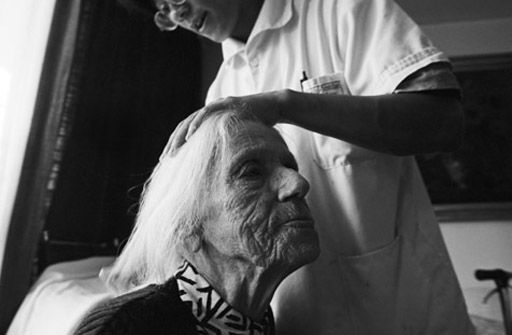
Medicaid home care aides — hourly workers who help the elderly and disabled with daily tasks like eating, getting dressed and bathing — are emerging as the latest target in the ongoing power struggle between conservatives and organized labor.
About half a million of these workers belong to the Service Employees International Union, a public-sector union that represents almost 1.9 million workers in the United States and Canada. The union is an influential donor to liberal politicians and boasted strong ties to the Obama administration.
A proposed rule from the federal Centers for Medicare & Medicaid Services would prohibit home health aides paid directly by Medicaid from having their union dues automatically deducted from their paychecks, though it doesn’t name the fees explicitly.
Blocking these direct Medicaid payments means the workers — especially those who don’t work in a single, centralized office, or don’t have a credit card or a bank account — are far less likely to pay dues, diminishing the union’s potential influence.
CMS’ language affects only “individual providers” — that is, those who aren’t employed by the private, for-profit agencies that dominate this industry. Individual providers, who are technically state employees, are far more likely to be unionized.
The directive, which would overturn an Obama administration policy put in place to ease the collection of union dues and pay for other fees, such as health benefits, could take effect by the end of this year. A month-long comment period, ending Monday, has attracted more than 3,300 responses.
“This is just another way to make life more difficult for public-sector unions,” said Jake Rosenfeld, an associate professor of sociology at Washington University in St. Louis, who studies unions and their influence.
The proposed rule comes on the heels of June’s landmark Supreme Court ruling, in which a 5-4 majority held that public-sector workers don’t have to pay unions for the cost of collective bargaining, calling it a violation of their free speech.
That decision expanded on the Supreme Court’s 2014 ruling in Harris v. Quinn, in which the high court found that home care workers must explicitly state their desire to be in a union before the organization can collect dues. But because these workers are not attached to a single office or meeting point, organizing them into a collective unit poses a distinct challenge; collecting membership dues, even more so.
As union membership has waned in other sectors, organized labor has doubled down on home care, lobbying liberal governors to declare thousands of workers as state employees, rendering them eligible to organize and engage in collective bargaining.
The median annual salary for home health aides in 2017 was $23,100, with about 67 percent turnover in 2017. The federal Bureau for Labor Statistics projects that demand for home care will increase by as much as 41 percent from 2016 to 2026, as more Americans age.
Both SEIU and the National Employment Law Project, an advocacy group, said that, if the rule takes effect, they expect to file a lawsuit seeking to reverse the decision. And a spokesperson for California Attorney General Xavier Becerra, who has frequently clashed with the White House, said the state will “take any action necessary” to blunt its impact.
In states where home care workers are unionized, the group can have the state withhold membership fees from their paycheck and transfer them directly to the union. Workers must actively choose to join the union.
In California, where most home care workers don’t work for private agencies, about 250,000 belong to the state SEIU chapter.
“They’ll effectively lose their voice on the job and their ability to advocate,” said Laphonza Butler, president of SEIU Local 2015, the California branch of the union.
Beyond California, home care aides have unionized in states including Connecticut, Massachusetts, Minnesota, Illinois, Oregon, Vermont and Washington.
The government is arguing that federal law does not allow states to divert Medicaid dollars to pay for a home care worker’s other benefits, such as health care or job training.
“The law provides that Medicaid providers must be paid directly and cannot have part of their payments diverted to third parties outside of a few very specific exceptions,” said Tim Hill, acting director for CMS’ Center for Medicaid and CHIP Services, in a statement.
Supporters of the rule, such as the National Federation of Independent Businesses, argue it stops powerful unions from using taxpayer dollars to pad their lobbying budget.
But it’s a controversial take. Critics said CMS’ argument inappropriately casts workers’ paychecks as government property, instead of as their own money. And they said it leaves vulnerable workers — arguably, the backbone of elderly care — unable to fend for themselves.
“When a state pays a worker, and the worker pays the union, it’s the worker’s money going into the union,” said Benjamin Sachs, a professor at Harvard Law School who studies labor law. “CMS doesn’t have the authority to decide.”
Some conservatives suggested that limiting union membership is less about home care policy and more about curtailing a powerful liberal lobbying force.
“There have been steps taken in underlying law and practice to provide extra favors to public sector unions. They are as much political bodies as they are representatives,” argued Thomas Miller, a resident fellow at the conservative American Enterprise Institute.
But labor advocates warned the consequences could be steep, and not just for home care workers.
Surveys from the National Employment Law Project suggest that unionized home care workers stay in their jobs longer when represented by unions, partially because they can negotiate better pay and benefits. Higher pay also makes the job more appealing, especially as need grows.
That, many experts argued, means patients also benefit.
“We can be putting more money into making these good quality jobs. The shortages and turnover we are facing —it is not rocket science what is causing that,” said Caitlin Connolly, who runs the National Employment Law Project’s campaign to increase home care wages. “If we made these quality jobs, we would be able to ensure that people had access to quality care.”


